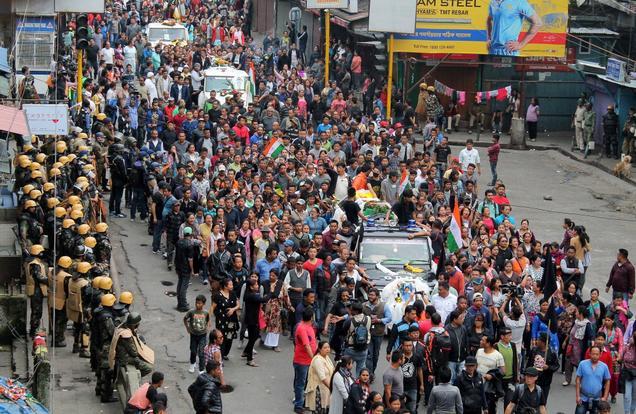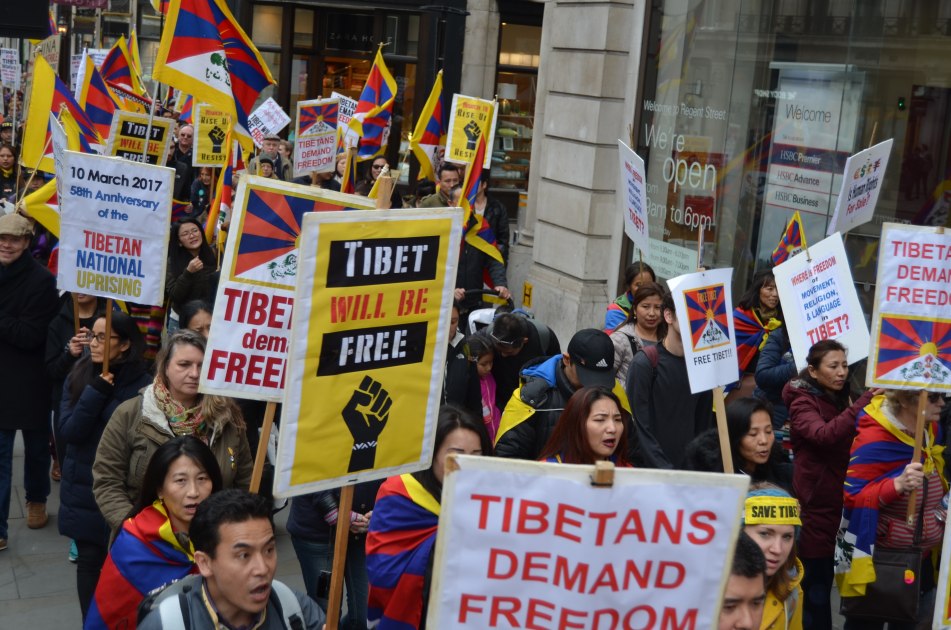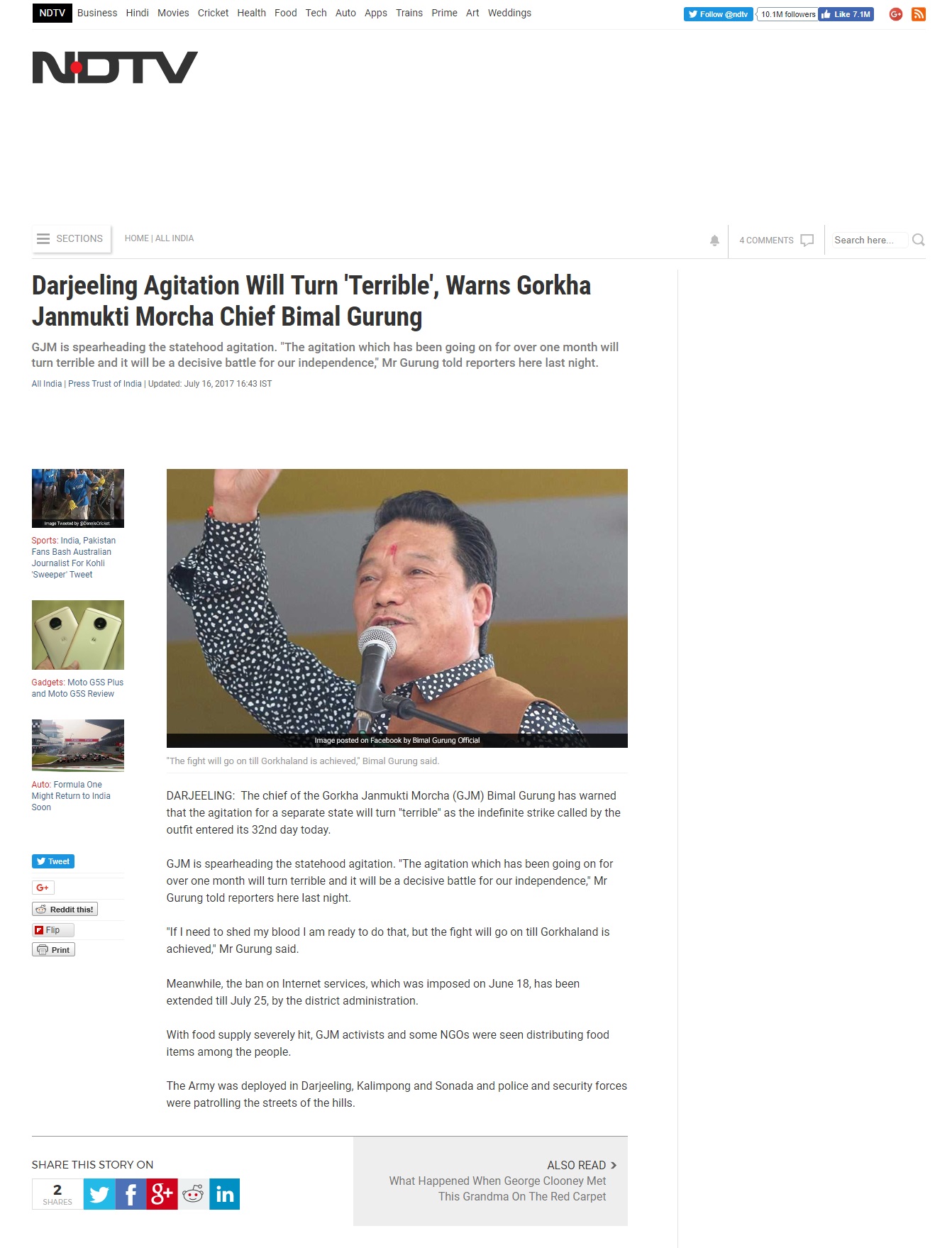The Gorkhaland issue in West Bengal, India, has been a hot topic on various online news portals and social media platforms for the last couple of months now. The Gorkha people, ethnically Nepali but having lived in India for centuries, are seeking their own state after claiming that West Bengal authorities have been stifling their cultural rights, in direct contradiction to the Indian constitution that enshrines a multi-ethnic ethos.

Led by the Gorkha Janmukti Morcha in Sikkim, Gorkha people are protesting and demanding a proposed separate state from West Bengal within India.
Amid strikes, riots and protests against West Bengal authorities, the Gorkha people are being led by the Gorkha Janmukti Morcha (GJM) in Sikkim to demand a proposed separate state from West Bengal within India. They are willing to take extreme measures to make their case heard by the Indian government, even calling for self-immolations to further their cause. Such extreme measures are not uncommon amongst another community to be found in India: the Tibetans in exile.
Striving for their own country or autonomous state (depending on who you talk to), hundreds of Tibetans have self-immolated as part of their resistance towards the Chinese leadership. They do this hoping to apply pressure on them in order to achieve their political goals. Many of these self-immolations have taken place in India, whose government has been extremely kind and generous to offer asylum and refuge to the Tibetans for the last 60 years.

Free Tibet protestors demand for complete independence for Tibet
However, it is apparent that the Central Tibetan Administration (CTA; Tibetan leadership in Dharamsala) has done nothing to reciprocate this kindness from the Indian government. Especially during crucial times when India faces several domestic issues, the Tibetan leadership often fails to offer support for India or fails to take any concrete action to help. Given their tragic history, you would think that the Tibetan leadership would speak up and help to solve the situation. As in the case of Gorkhaland for example, aiding in a peaceful solution, whatever that may be, would be a great sign of reciprocation that they actually care about India, the country they are living in. However, based on their track record, the Tibetan leadership is going to remain silent and not do anything. Here are some reasons why this is the case:
- Sikyong Lobsang Sangay does not care about the welfare of India and her citizens. He is too busy travelling around the world, pandering for donations. On top of this, has anyone ever wondered where all the donations actually go? The fact is, the educational system and living standards of the Tibetans have not improved over the last 60 years despite the billions of dollars in donations that they have received. So where did all the money go? Despite the obvious issues plaguing his people, Lobsang Sangay has the time to travel and look for “donations” but he does not have the time to make a single statement to offer his support for India. Of course, the thought that they can offer support for India does not even cross the minds of the Tibetan leadership.
- The Tibetan leadership encourages their people to be racist and look down on the Indians. When a Tibetan marries an Indian, it becomes a moment of shame; when a Tibetan marries another Tibetan or a Westerner, it is considered a moment of pride. The same shame about becoming or being associated with Indians is reflected in how the Tibetan leadership blocks Tibetans from applying for an Indian passport. On the other hand, the Tibetan leadership do nothing to stop Tibetans from travelling overseas and seeking citizenship in other countries such as the USA or in Europe. These Western-bound Tibetans do not face the same restrictions and limitations as those wanting Indian citizenship. Such preferential treatment speaks volumes and suggests racist attitudes from the Tibetan leadership. The shameful thing here is that when Tibet needed help the most, it was only India who opened her doors to them and no one else did so. It is India who has been kind enough to host the Tibetan exile population for the past six decades, but the Tibetan leadership continues to treat India like a second-rate option.
- The Tibetan leadership secretly rejoices at the conflict between Gorkhaland and Indian authorities, and that is why they have not issued a statement on the issue. Perhaps the CTA resents India and holds a grudge against them for giving Tibetans the right to become Indian citizens, as it leaves the CTA with an even smaller pool of Tibetans that they can manipulate. The Tibetan leadership should in fact be grateful towards the Indian government naturalizing Tibetans, as this opens up better opportunities for employment, travel and better education for their people. Naturalization does not mean that Tibetans cannot continue to fight for the Tibetan cause and it does not make them any less patriotic. Why is a Western-born Tibetan considered Tibetan, but someone who carries an Indian passport is considered a traitor? If the Tibetan leadership is unhappy with India for giving their Tibetan people more freedom, it just goes to show the CTA do not have the best interests of their people at heart. If they did, they would not create so many obstacles to stop the Tibetans from getting Indian citizenship. Superficially it may seem that the CTA is ‘grateful’ and ‘respectful’ of India, but in actual fact, they have no sense of gratitude. It is ironic that the CTA resents India, even as they continue to live on their land.
- Although the situation in Gorkhaland is similar to what is happening with the Tibetan issue, the CTA dare not upset India by supporting the wrong side. Ultimately, they do not want to be kicked out of India so they would rather be silent on India’s internal issues and only speak up when it is to spite China or to further their own political causes. So the CTA remains silent and dare not stick their neck out for Indian interests though the country has done so much for them. This again proves that their own wellbeing is far more important than anyone else.
- In general, the Tibetan leadership are just too wealthy to be bothered with India’s affairs. Sikyong Lobsang Sangye’s foreign forays to fundraise purportedly to “help the Tibetans” contrasts with how some Tibetans actually live. An outsider looking in at the ornate temples and large houses that belong to the Tibetans within their settlements makes one wonder if they are really ‘refugees’ fleeing their homeland or not. What other refugee community in the world builds such large, elaborate statues and temples while their people continue to linger in poverty? It does not come across as a community fearful about being persecuted; it comes across as a community exploiting people’s sympathies and the fact they may have once been persecuted, in order to financially gain from this. In fact, the average Tibetan is financially more well-off than the average Indian. So if the Tibetans have so much excess money, why do they not do more to help India and repay some of the kindness shown to them? No tangible actions have been taken by the CTA to help the local Indian communities around the Tibetan settlements, let alone those of other states within India.

One of the ornate temples that belong to the Tibetans within their settlements
In conclusion, from the treatment by the Tibetan leadership towards India, it begs the question: why should India continue to host the Tibetans since they do not display a sense of gratitude? Through their continued behavior and lack of manners, it is clear that the Tibetan leadership harbors resentment towards India regarding the citizenship issue. Otherwise why else would they fail to encourage their international man of peace, His Holiness the Dalai Lama, to say a few words on the Gorkhaland issue?
India owes nothing to the Tibetans. It is actually the other way around: Tibetans owe everything to India for giving them a safe haven during their time of need. Hence the Tibetan lack of silence over the turbulent Gorkhaland matter reflects the CTA’s selfish policies and over-inflated sense of self-importance. Coupled with a lack of transparency regarding funds being channeled to the Tibetan leadership’s pockets rather than to further the Tibetan cause or to benefit social causes within the populous, it is clear that there is a serious problem – there is a distinct lack of accountability within the Tibetan leadership. They are not even accountable to the people that they claim to serve.
Since this is the case, why should the people around the world continue to provide them with more funds and feed the very leaders that obstruct and growth of the Tibetans? And why should India continue to treat the Tibetans kindly? It is simple. They should not. Time for the Tibetan leadership to learn some gratitude, and to show it towards India with measurable, tangible results. Six decades of exploiting the Indian government and people’s kindness is six decades too long.

Click to enlarge. (Source: http://www.ndtv.com/india-news/darjeeling-agitation-will-turn-terrible-warns-gorkha-janmukti-morcha-chief-bimal-gurung-1725428)
MORE NEWS LIKE THIS